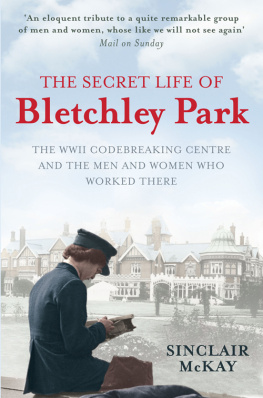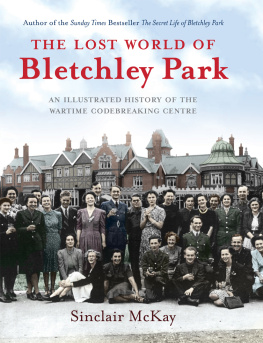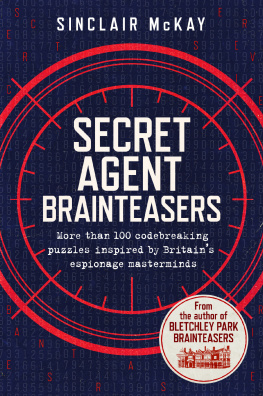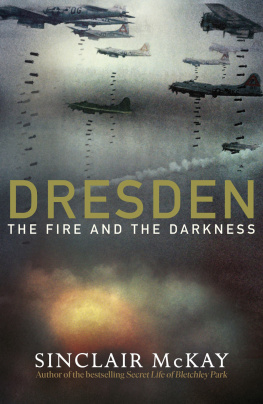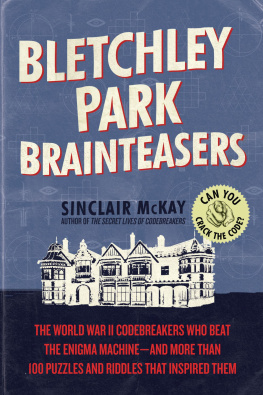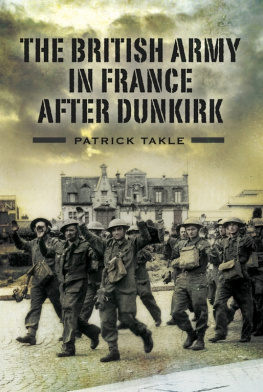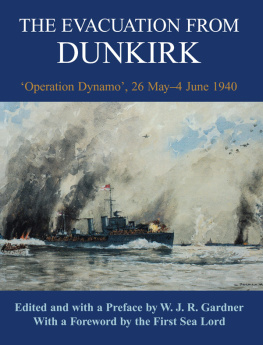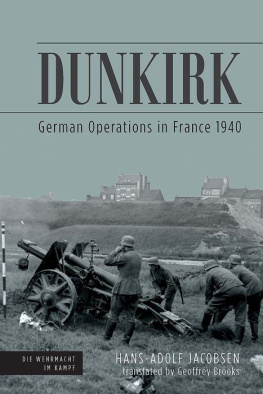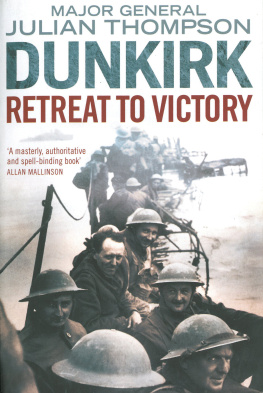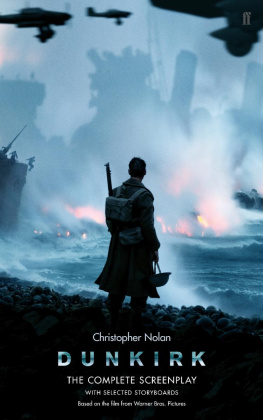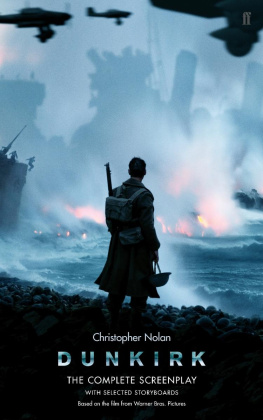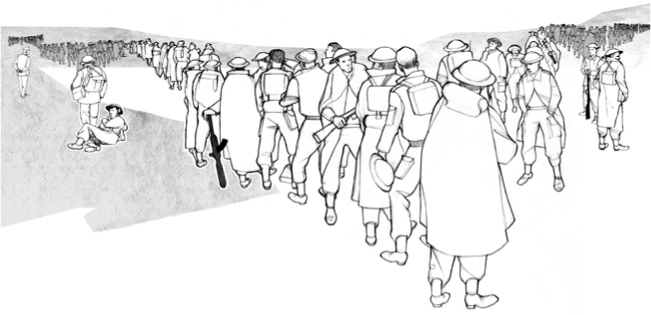Dunkirk
From Disaster to Deliverance
Testimonies of the Last Survivors
SINCLAIR McKAY

First published in 2014
by Aurum Press Ltd, 7477 White Lion Street, London N1 9PF
www.aurumpress.co.uk
This eBook edition first published in 2014
Copyright Sinclair McKay 2014
Sinclair McKay has asserted his moral right to be identified as the Author of this Work in accordance with the Copyright Designs and Patents Act 1988.
All rights reserved
This eBook is copyright material and must not be copied, reproduced, transferred, distributed, leased, licensed or publicly performed or used in any way except as specifically permitted in writing by the publishers, as allowed under the terms and conditions under which it was purchased or as strictly permitted by applicable copyright law. Any unauthorised distribution or use of this text may be a direct infringement of the authors and publishers rights, and those responsible may be liable in law accordingly
Illustration by Richard Beacham
Digital edition: 978-1-78131-384-8
Hardcover edition: 978-1-78131-293-3
eBook conversion by Quarto Publishing Group USA
Contents
Other similar Aurum titles:
A Brilliant Little Operation
by Paddy Ashdown
Aurum Press Ltd
Print & ebook
The Secret Life of Bletchley Park
by Sinclair McKay
Aurum Press Ltd
Print & eBook
Unlikely Warriors
by Richard Baxell
Aurum Press Ltd
Print & eBook
A Very Strange Way to Go to War
by Andrew Vine
Aurum Press Ltd
Print & eBook
Requisitioned
by John Martin Robinson
Aurum Press Ltd
Print
Coming Soon:
British Spy Manual
By IWM with introduction by Sinclair McKay
Aurum Press Ltd
Print
Prologue
The small elegant boats bob and curtsey, dipping daintily as the fresh river water ripples over their bows. A silent September Sunday morning, early and pale blue, the sun warming, although the breeze brings news of autumn. There is a labyrinth of narrow wooden jetties, and moored beside them a polished mass of smart 1930s vintage Thames motor yachts. We are upstream of Hampton Court Bridge; the great palace lies beyond. And here, on the grassy bank of the River Thames, under attentive oaks, a convocation of old men and their families is taking place.
For the moment, they are still. A prayer is being said, a lone voice rising above the silence. But the atmosphere is celebratory. In attendance is HRH Prince Michael of Kent. Also present are a great number of young naval cadets, girls and boys, alongside a multitude of jolly women in smart frocks, and wind-burned men in boating blazers and white trousers. There is a pleasing incongruity about their presence next to the very elderly soldiers in berets, with full medals on show. The mix of people is fitting: the story they are commemorating, one which they celebrate here annually, is a brilliant and perhaps unique instance of the military, the navy and enthusiastic sea-going civilians all joining together in one courageous enterprise.
Now the mingling has begun. Some of these veterans, in their mid-nineties, have been brought from across the country in coaches with their families and friends and associates. This is their chance to catch up with some of those faces familiar from so many years ago. Their families know one another too. There is always much to discuss. But the day is only just beginning. With unobtrusive help from the smiling young naval cadets, the old soldiers are helped from that grassy shore, along the slightly slippery wooden jetties, and thence aboard the Thames pleasure boats. Each veteran has been allocated a space. The boats have an emotional resonance that for these men can never fade. They are just a few of the little ships the boats that, in May 1940, were among a great fleet of varied vessels that sailed back and forth across the English Channel to rescue a host of Allied soldiers and in so doing, forged a national legend that is now invoked more than any misty myth like Excalibur or Camelot. This particular legend encapsulates how the British still like to define themselves. The core image is of a sea-going island people with a genius for improvisation; it also incorporates the giftedness of untrained amateurs, the extraordinary courage of ordinary men, and the life-affirming eccentricity of taking on a technologically ruthless foe with an armada of tiny boats intended for Sunday afternoon river jaunts.
Some now refer to the myth of Dunkirk and seek to point out that the evacuation of some 338,000 troops, British, French and Belgian, in the space of nine days, from an encircled, bombed-out harbour and beaches, was not all about ordinary civilians. No, of course it wasnt; it was about the Royal Navy and the RAF, and about young untested soldiers finding within themselves depths of endurance that their scanty training alone could not have helped summon. But the word myth has another meaning, that of allegory. So the myth of Dunkirk can also be taken as an allegory for Britain as it then was; a fleeting but crucial historical moment in which the character of the people civilian and military was suddenly illuminated, as though in a lightning flash.
These pleasure boats which were among some 700 vessels that wove between Dover, Ramsgate, Margate and Dunkirk, in routes that steered past lethal hazards like mines, and obstacles such as submerged destroyers and paddle steamers and the Goodwin Sands, and through the harrowing dangers of bombs and machine guns now, on this early Sunday morning, look so gleaming and smart and creamy in their leather furnishings that it is difficult to believe that they have been sailing for over seventy-five years. This community of vessels though owned by all sorts of different people is watched over lovingly by the Association of Dunkirk Little Ships, which also organises the annual reunions. The Dunkirk veterans some army, some navy take their seats on board, in the open, under the strengthening sun, listening to the Thames slurping at the hulls. The proud owners of the boats understood, when they bought these vessels, that they were buying history, and that they would have to take care that the past was honoured. What finer way to fulfil that task than a Sunday morning jaunt with such distinguished veterans on board?
Other naval traditions are carefully observed. The enthusiastic juvenile naval cadets ask the aged veterans if they would care for a warming tot; rum, perhaps, but there is whisky too. The wind on the water is brisk; the veterans do not refuse. This was also the case on that splendid if utterly soaking summer day in 2012 when, to mark the Queens Diamond Jubilee, the little ships took part in a great Thames pageant. These veterans were there, sailing through the City of London under those swags of icy rain, sipping whisky. Those of us who witnessed the ships passing I watched from the balcony of my flat in Limehouse, in the east found the spectacle inexplicably moving. After all, they were just boats; and it was all a very long time ago. How could it possibly stir any feeling now? Yet as they sailed by, I felt my eyes prickle. Others who watched the spectacle that day found the same, again without truly understanding why.
Today, the veterans destination is a grand lunch, to be held a few miles upstream. On this stretch of the river, the charming villas of suburbia gradually give way to a world that is more redolent of


